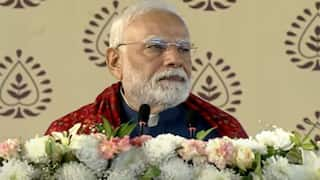Explorer
Advertisement
2020 Economy: Battered Businesses & The Way Forward
Even though markets seem to have recovered with the Sensex and Nifty recording new high, the challenges for Indian economy are far from over as inflation is rearing its ugly head and unemployment remains a major hurdle.

Representational Image/ Getty
2020 has given us the worst memories of all times, thanks to novel coronavirus that shattered most of our future plans. The news of pandemic broke early in January and by March the virus shook every nation as the world started bracing up to fight the tiny minuscule virus. The pandemic has put a brake in the world economy as countries tried to rein in the spread of virus by imposing lockdown after infections started taking a toll on human lives. Also Read: US | Severe Allergic Reaction In Healthcare Workers After Pfizer Shot; Concerns Over Side-Effects Rise Again
In March, the Modi government also declared a 21 day-lockdown to control the transmission of the disease. The lockdown in our country was the harshest and extensive among all other nations. The challenging decision was met with resistance as it forced migrant workers to head back to their towns with several businesses taking a severe hit.
In the April-June quarter, the Indian gross domestic product shrank by 23.9% – the worst contraction ever in the country’s history. The economy also shrank in the following quarter which marked India’s first technical recession since the time when British left in 1947.
With a view to offer some cushion to the economy, the government announced $23 billion economic package on 26 March aimed towards supporting the poor, providing rations of grains and pulses, free gas cooking cylinders to 83 million families, and cash transfers of $6.65 a month to about 200 million women for the next three months. Even though some believed that the package is too little, less than 1% of India’s gross domestic product, and there is more required to support the people.
Since then the government has taken various efforts to prop demand in the economy and get the economy on track. Markets have recovered with the Sensex and Nifty recording its new high, but the challenges are far from over.
Let us look at the major steps taken by the government in 2020 to push the economy amid the recessionary concerns.
Farms laws: According to the new farm bills passed by the government, farmers have been given the freedom to sell produce outside of state-designated market yards. They can enter into contract farming agreements with buyers. Basically, farmers can now enter into ‘written agreements’ with anyone, including a company, and sell them their produce for a set period of time, as per the contract. They can set the price for the produce, the standards and qualities, and other legalities beforehand.
Labour reforms: As many as 44 central labour laws were subsumed under four labour codes in 2020, as the government works to bolster investments and tackle slowdown blues. The labour reforms assume significance as India’s GDP growth fell to an over-six-year low of 4.5 percent in the second quarter of 2019-20 while retail inflation rose to 40-month-high of 5.54 percent in November. The new bills include the industrial relations code that will allow companies with as many as 300 workers to fire them without seeking prior government approval, a three-fold jump from the current threshold. The other two bills that have been approved are related to social security and occupational safety.
Heralding the 'Atmanirbhar Bharat' Movement: The year 2020 also saw the germination of the idea of Atmanirbhar Bharat. Prime Minister Narendra Modi gave the nation a new vision, a new mission called 'Atmanirbhar Bharat' this year. Atmanirbhar Bharat, which translates to 'self-reliant India' or 'self-sufficient India', is a policy formulated for making India "a bigger and more important part of the global economy", pursuing policies that are efficient, competitive and resilient, and being self-sustaining and self-generating.
FDI in defence: In September, the government allowed foreign direct investment (FDI) of up to 74 per cent under the automatic route in the defence sector with a view to attracting overseas investors. However, the import of some weapons and platforms will not be allowed. The decision of FDI in the defence manufacturing was announced by FM Sitharaman in May while announcing the fourth tranche of the Rs 20 lakh crore stimulus package.
Embargo on import of 101 items: In a series of actions taken to promote 'Atmanirbhar Bharat', the Ministry of Defence prepared a list of 101 items and banned their import "beyond the timeline indicated against them". It has been a big step towards making the country self-reliant in the defence sector. The list of 101 embargoed items comprise of not just simple parts but also some high technology weapon systems like artillery guns, assault rifles, corvettes, sonar systems, transport aircraft, LCH, radars and many other items to fulfil the needs of our Defence Services. The list also includes, wheeled Armoured Fighting Vehicles (AFVs) with indicative import embargo date of December 2021, of which the Army is expected to contract almost 200 at an approximate cost of over Rs 5,000 crore.
Production-Linked Incentive (PLI): Another historic steps taken this year was the introduction of the Production-Linked Incentive (PLI) Scheme in 10 key sectors. The sectors include Advanced Chemistry Cell (ACC Battery), Electonic/Technology products, Automobile and Auto components, Pharmaceutical drugs, Telecom and Networking products, Textile products, Food products, High-efficiency solar PV modules, White goods and Speciality Steel. This is aimed to boost domestic manufacturing and attract large investments. As per the govt, the scheme will help create an ecosystem that will add Rs 20 lakh crore worth of manufacturing ecosystem and three crore well-paying jobs.
Reining FDI, FPI on China: In late April this year, the central government went ahead to amend its foreign direct investment policy (FDI) policy in order to restrain the predatory behaviour of Chinese investors into Indian companies. As per the new FDI norms, any country that shares a land border with India can no longer avail the automatic route in FDI, but have to seek government clearance over any investment proposal. The rules apply to Pakistan, Bhutan, Nepal, Myanmar, and Afghanistan as well. The government also intends to keep a check into Chinese investments in India through the Foreign Portfolio Investment (FPI) route.
Follow Business News on ABP Live for more latest stories and trending topics. Watch breaking news and top headlines online on ABP News LIVE TV
View More
Advertisement
Trending News
Advertisement
Advertisement
Top Headlines
India
Health
Cities
India
Advertisement


Nayanima Basu
Opinion






































